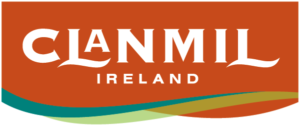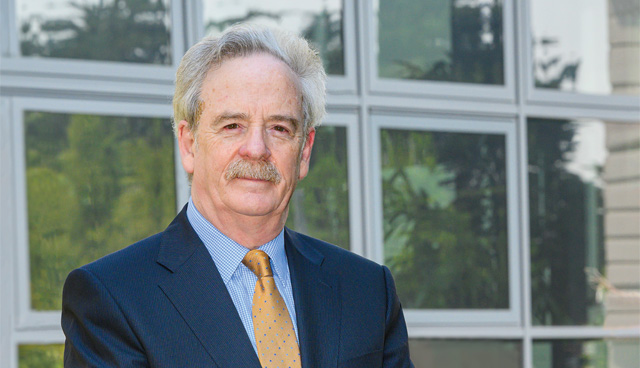
HAP: not value for money
22nd July 2020
In comparison: European private rental sectors
22nd July 2020Going for growth
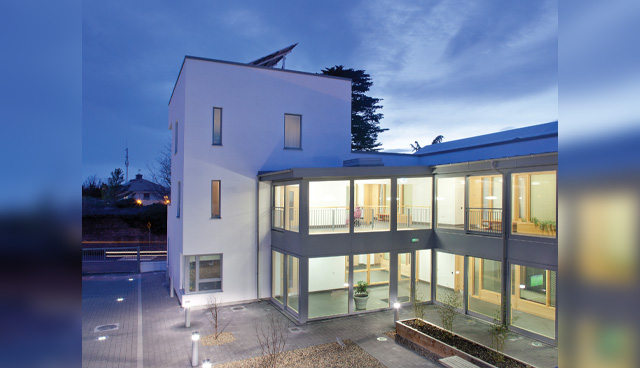
Valhalla, Clondalkin.
Clanmil Housing Association Ireland has experienced an annual growth of over 50 per cent in the last two years. CEO Michael Haynes speaks with the Housing Magazine about opportunities for further expansion and enhanced service delivery for tenants.
“Over the next 12 months, we want to expand further. Clanmil has a growth target of 50 units per annum and as such we’d like to attain 400 units by the close of 2020 and 450 by the end of 2021. Any increase beyond this target is a bonus,” Haynes asserts.
Since 2018, Clanmil Ireland has increased its portfolio from around 250 units to over 350. This growth is dual-pronged, having been enabled firstly by collaboration with developers to construct new units and secondly through partnership with other housing associations. Indeed, in June 2019, Clanmil merged with the smaller Léim An Bhradáin Housing Association (LABHA).
Mergers
The imminent implementation of enhanced regulation is going to present a challenge for volunteers in small approved housing bodies (AHBs). Ultimately, smaller AHBs are likely to consolidate their resources through partnership with larger organisations and subsequently provide an enhanced service for their tenants.
Indeed, LABHA did not employ any staff and all five board members were volunteers. Those five individuals each had full time jobs and had to pursue their housing association work in evenings and weekends. The advent of GDPR and forthcoming regulation was too significant a challenge and provoked an internal conversation which culminated in the directors selecting Clanmil for a merger.
Clanmil Ireland sought to approach this from a collaborative angle and was keen to avoid entering a partnership or merging with the smaller organisation without then giving it an opportunity to retain its voice.
“We are interested in partnering with small approved housing bodies. Having previously worked for a large housing association in the UK, I have experience of these organisations simply absorbing their small partners. We want to avoid this.
“While it’s about expansion and growing portfolios, it’s also about applying a more benign approach. For example, we have offered the LABHA board members a position on our board. Our 2019 amalgamation was very much a merger of equals,” the Clanmil CEO emphasises.
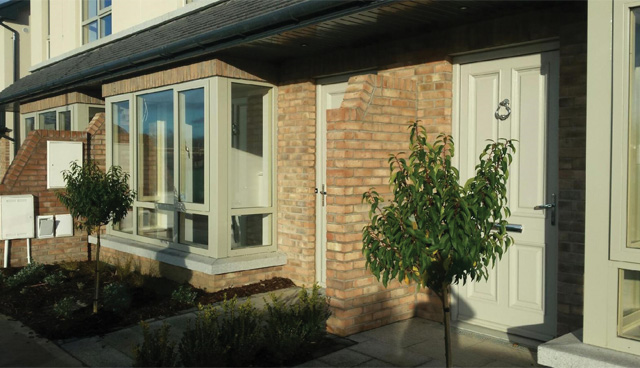
Carton Grove, Maynooth.
Benefits
Clanmil, which does employ staff and has systems and procedures in place, alongside partnerships with contractors for maintenance, was a suitable match for LABHA. Immediately, therefore, the tenants experienced an improved service and more efficient delivery by the housing professionals in the Clanmil team.
“When we met with its directors, the culture between LABHRA and Clanmil was strikingly similar with both organisations being primarily customer driven. Due to its small scale, the LABHA tenants had an intimate relationship with the board of directors. On the business side, however, a professionalisation of the service was required. For example, when tenants ring our office midweek, the phone will be answered, whereas previously they might have been forced to leave a voicemail and await a response.
“There was a shift for tenants, therefore, to a service provided by an organisation which has a recognised name, identity, office and staff. As such, there was some concern on the part of the tenants that the merger was a retrograde step. These misgivings evaporated almost instantaneously when the Clanmil team met with tenants in their homes and at their convenience. Crucially, the most significant outcome was that tenants have experienced improved service and a greater range of options,” Haynes outlines.
Lessons
Led by Haynes, the Clanmil team cooperated with LABHA to ensure that the merger project was concluded in a timely matter. The housing associations benefited from the CEO’s experience of similar mergers and the utilisation of processes he had previously applied.
“We conducted 32 meetings in 32 different households across a period of three or four weeks whereby we met every single tenant and their family. There was a substantial benefit for my staff in understanding individual needs and requirements of their service.
“For the Clanmil team, it drove home the importance of customer contact and the significance of personal interaction with a tenant, discussing individual circumstances. As such, it was less a case of lessons learnt and more a case of lessons confirmed,” he indicates.
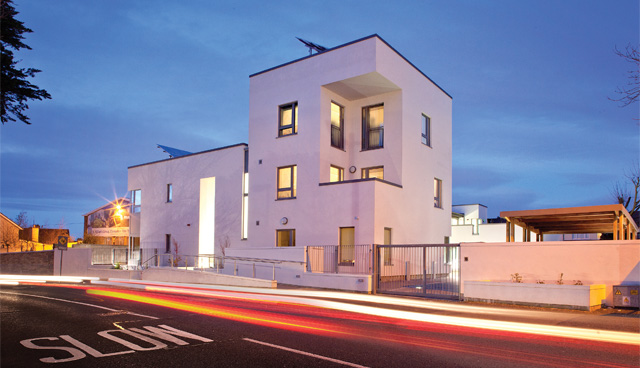
Valhalla, Clondalkin.
Opportunities
This year will be a watershed moment at Clanmil. For the previous two years, Haynes as been an operational chief executive endeavouring to set a new course for his organisation. “We have embarked upon a recruitment process to acquire three managers. That will represent the first time in Clanmil Ireland’s 19-year history that it will have a management structure in place.
“This will be of huge benefit to our organisation and our tenants alike. As we grow, we must have dedicated people in position to oversee the various components of the business. It’s also a fantastic career opportunity for the staff,” he explains.
Externally, there is an opportunity for AHBs to transfer off the government balance sheet, a move that has widespread support within the sector. While suggesting that the challenge is not insurmountable, Haynes advocates that the AHBs work with government to secure this change.
“Approved housing bodies must move off the government balance sheet. Whilst this hasn’t created any constraints yet, it will do if we continue in the direction we have been travelling. In that scenario, we would be competing with schools, hospitals and transport infrastructure for funding. This would restrict the opportunities for us to go out and undertake innovative projects, borrowing in volume from organisations other than the Housing Finance Agency,” he contends.
Meanwhile, as Ireland emerges from the Covid-19 lockdown restrictions and faces into recession, the Clanmil CEO believes that social housing construction could act as an economic stimulus.
“House builders are cognisant that there is going to be less of a market for their product and many have already initiated construction. There are going to be huge opportunities for the social housing sector to acquire properties that ordinarily wouldn’t be available.
“The difference between this current recession and its predecessor is that there is plenty of finance available. The banks are in a relatively decent position, as is the social housing sector. Approved housing bodies must take advantage of the situation that they find themselves in as willing purchasers of properties. I envisage the sector as being a lifeblood for the construction industry,” he says.
Ambitions
Clanmil’s main ambition for the time ahead is to grow and become a significant player in the Irish social housing sector. “Our sector will transform over the next five years. Regulation is about to be implemented, the number of AHBs will subsequently shrink drastically. Clanmil Ireland wants to seize this opportunity, establish itself as a key stakeholder and contribute to solving the housing crisis in the short-to-medium term. This will consolidate our long-term position in the sector.
“From a personal perspective, it’s about applying an emphasis on growing and developing the business so that if I move on at some point in the future, I leave a legacy of a bigger and better organisation,” Haynes concludes.
Clanmil Housing Association Ireland
T: 01 456 8079/086 044 4228
E: michael.haynes@clanmilireland.ie
W: www.clanmilireland.ie
